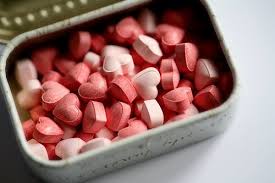Love is the Drug

Does love really act like a drug?
[pullquote align=center]
Showing out, showing out, hit and run
Boy meets girl where the beat goes on
Stitched up tight, can’t shake free
Love is the drug, got a hook on me
Love is the drug I’m thinking of
Oh oh can’t you see
Love is the drug for me…….
[/pullquote]
excerpt of “Love is the Drug” Lyrics, Roxy Music
Can I Be Addicted To Love?
[pullquote align=center]
Your lights are on, but you’re not home
Your mind is not your own
Your heart sweats, your body shakes
Another kiss is what it takes
You can’t sleep, you can’t eat
There’s no doubt, you’re in deep
Your throat is tight, you can’t breathe
Another kiss is all you need
Whoa, you like to think that you’re immune to the stuff, oh yeah
It’s closer to the truth to say you can’t get enough
You know you’re gonna have to face it, you’re addicted to love
You’re running at a different speed
Your heart beats in double time
Another kiss and you’ll be mine, a one track mind
Oblivion is all you crave…
[/pullquote]
excerpt of “Addicted to Love” Lyrics, Robert Palmer
[space_20]
Yes and Yes! Love is like an Addictive Drug
Scientific studies show that feelings of love affect the brain in the same way many addictive drugs do, by targeting dopamine (the “feel good” chemical) in the reward area of the brain.
And we all thought it was the heart that ruled right? It is the brain that is the major player when it comes to falling in love. Intense feelings of romantic love affect the brain in the same way drugs like cocaine or powerful pain relievers do, by activating the reward area of the brain that makes you feel good. Romantic love is a primitive response and is one of the most powerful emotions a person can have, whether intense high elation or deep low depression.
Our brains have been wired to choose a mate and sometimes we can go to extremes to win and keep their attention and affection. Think of love at first sight, and the heady early phase of a relationship, when you have just met and are in your “honeymoon phase”. What about how terribly painful it feels to be rejected by the one you have fallen in love with. No wonder why idioms such as “love is blind” when you are “head over heels” in love, and “mad about you” are commonly used, understood and that you can relate to.
Brain studies suggest that love does change over time and that the initial passionate, euphoric and obsessive feelings can gradually fade away over time but not necessarily completely. For most people it transitions to a more long-term mature bonding where feelings of calm, attachment and security replace the obsessive and possessive intoxicating passion. Interestingly long-term love also showed activity in the regions linked with attachment and liking a reward and this reward system has also been shown to be critical in pain management. So not only does love act like a drug, making you feel good, it really can act like a pain killer by reducing and relieving pain. Studies showed that both love and distraction reduced pain, but in different ways. When distracted, the brain pathway affecting the sensation of pain was mostly centered in the higher, cortical part of the brain, while the impact of love was on the brain’s dopamine-related reward center.
So there you have it, love IS like a drug.
sources: WedMD, Huffington Post

Recent Comments